Siegmund Spiegel Interview
Siegmund Spiegel was a friend of Toni in Gera who currently resides in Bal Harbour, Florida. He was also friend with Yitzack, Bill and Saul Katz. As leader of a Youth Aliyah group in Gera, he helped them prepare for immigration to Palestine. He eventually immigrated to the USA, where he joined the US army and fought in North Africa and Europe to help defeat Hitler's Germany. His brother, Norbert (later Nahum Golan), immigrated to Palestine and participated in the capture of Eilat in 1949 as a commander of the Golani Brigade.
Siegmund Spiegel is one of the people featured in "About Face", the 2005 documentary about German Jewish soldiers in the US army during WWII by Stephen Karras. He also describes his experience as an German Jew in the American army during WWII in the book The Enemy I Knew" by Steven Karras (Zenith Press, 2009).
I met Siegmund Spiegel in December 2005 and he spoke to me for several hours about the Katz families and life in Gera. Here's a slightly abbreviated transcript of our conversation.
(..?..): tape unclear, could not transcribe
(?): meaning unclear
Part 1
Siegmund Spiegel: I left Germany just before the Polish Jews were deported, which was in October 38. I left the last day of August 38. I tried to get Toni over here - I tried to get her to come to America.
Daniel Abraham: You told [Toni] she should come to the USA? Or you tried to organize it?
S.S.: I tried to organize it
D.A.: And she wanted to come?
S.S.: Yes... and then things happened too quickly. As a matter of fact, I spent literally days pursuing some of the Katz family that lived in New York. There was one of the brothers. You know in Gera there were three Katz brothers. Leo was Toni's father, there was Aaron, and Mathes... But then there was another brother who lived here. And I saw him late 1938... He lived somewhere in Brooklyn, he was a waiter in a Jewish deli. I talked to him about papers for Toni, and he said he couldn't help. He said he was in "tzuris" himself... He already had enough problems himself, his wife was ill, and so on, so he was no help. He couldn't...
D.A.: Financially?
S.S.: Financially he was incapable, and illness in the family, and so on and so on. I had papers from my boss at the time, but still... it didn't materialize, because then things happened too quickly. First Toni was not in Gera when they deported all the foreign Jews... I don't know where she was at the time...
D.A.: She was in a Zionist training camp. [Jägerslust, in Flensburg]
S.S.: She was in Hachshara, to prepare herself to go to Palestine, and then, ultimately she went to Israel, she got married... Of course Yitzhak had left earlier, with Youth Aliyah, so he was already in ...(..?..).. He also was a boy in one of my youth groups, which I lead.
Part 2: Photos
D.A.: Can we go over some photographs?
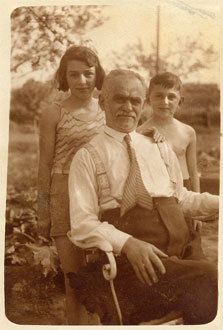
S.S.: This is Leo, Yitzhak and Toni, I don't know where.
(Back of photo says: "In Langer's garden")
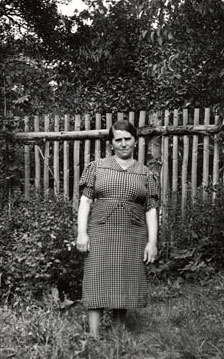
(Photo courtesy of Shulik Mir)
S.S.: This looks familiar, it almost looks like, one Jewish family which had a garden, friends. This almost looks like the garden in (...???...)
The Katz didn't have a garden. They lived in an apartment. As a matter of fact, in the beginning, they lived in an apartment, the store was up front.
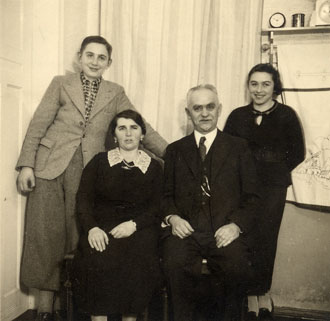
S.S.: This is in their apartment, I assume. They didn't own a house. They rented.
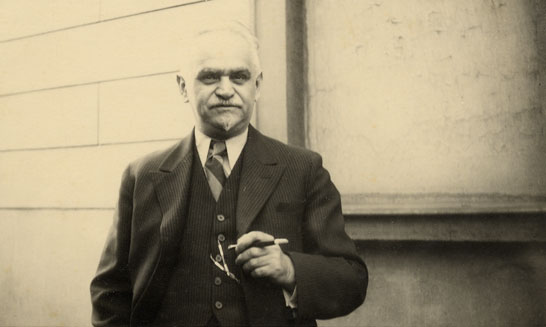
(Photo courtesy of Shulik Mir)
S.S.: I don't know what the building behind is. (I believe this is the house of the Bierman). Leo always smoked with a cigarette holder.
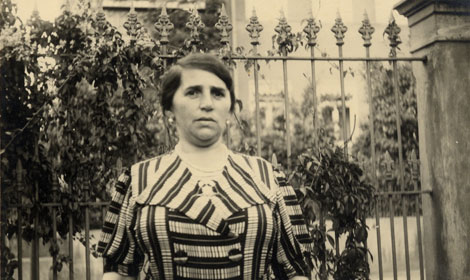
(Photo courtesy of Shulik Mir)
S.S.: Frida was a very energetic lady. She was a business woman. She worked... whereas he stayed to manage the store... They had a retail business, time-payments, and she went out collecting, too.
D.A.: She went to collect, but not him?
S.S.: That's correct. He was somewhat, not too fast on his feet, he was not incapacitated... but he was a slow-moving person, and she was a very energetic lady.
D.A.: But as far as...?
S.S.: Oh no, he was fine, as far as mental is concerned, he was absolutely fine.
D.A.: So you're saying she was the tough one...
S.S.: She was the tough one, yeah, certainly tougher than he was.
D.A.: So he was too nice?...
S.S.: He was more easygoing... and basically all the Katz brothers were sedate in a sense, they were moving one step after the other, they were not go-getters in that sense. I think the wives were much more energetic.
I think this probably was the business. They all went in that sort of business, like most Eastern European Jews worked at the time, you know, they worked at the businesses where you had the part-time payment, same thing as Mary's husband had the same thing here, Jakob. He had the same type of business when he opened up his shop in Harlem.
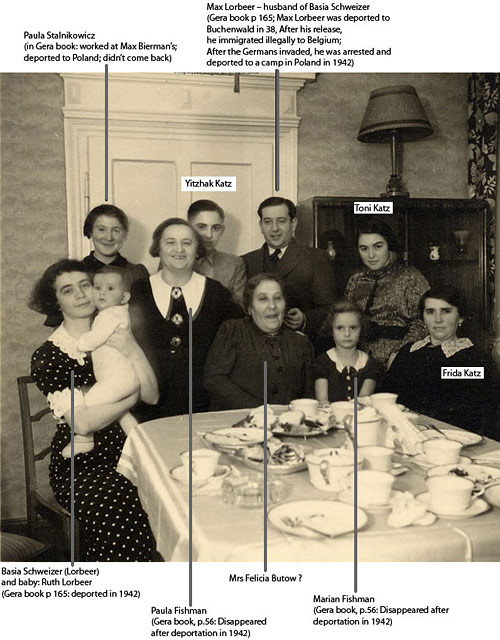
Paula Stalnikowicz, Max Lorbeer, Yitzhak, Toni and Frida Katz, Basia Schweizer (Lorbeer), Paula Fishman, Felicia (Felicitas?) Bütow (?), Marian Fishman
S.S.: Not sure whose apartment this was. This doesn't appear to be the Katz's apartment. None of these people were relatives of the Katz.
All these people were deported, aside from Yitzhak and Toni Katz
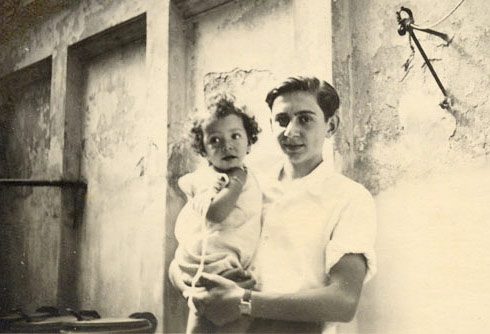
(Photo courtesy of Shulik Mir)
S.S.: This is in Gera, Yitzhak is holding Aviva Cohn, the daughter of their "preacher" - he was not a rabbi, he didn't quite make his rabbinate, and Toni used to babysit for this girl, and maybe Yitzhak did too. The Cohn came to America, he got a job in the state of Washington.
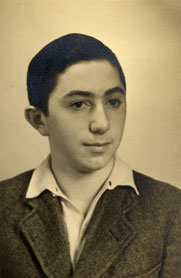
S.S.: This is Saul Katz - Bill and Michael's half brother - he was a very nice boy
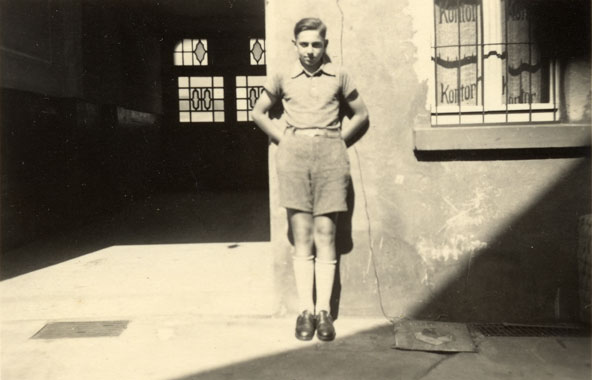
(Photo courtesy of Shulik Mir)
S.S.: This is Yitzhak in front of somebody's business - there is the "kontor" sign in the window. He probably was bar-mitzvah age, or not even... But I don't recognize the building. This not their home.
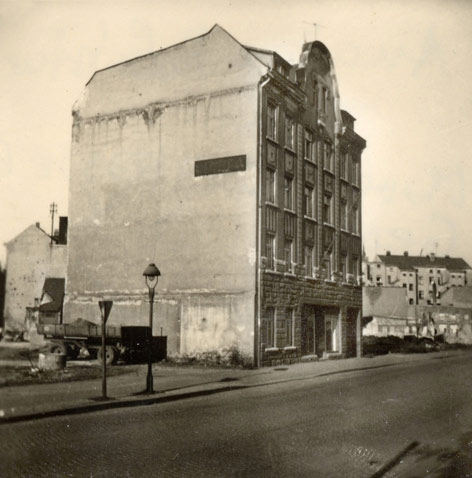
S.S.: I think this is the building where they had their store, MargaretenGasse. This was the original address. [(LeontinenStrasse was after they lost the business)]
The store was in front, I believe that's where it was. This is where they lived upstairs.
D.A.: What kind of neighborhood was this? It seems very desolate, this seems to be the only building standing in the street...
S.S.: All the neighborhoods there had changed. The city itself was old... as a matter of fact I went back in 1995, and you could hardly recognize anything.
D.A.: The street doesn't exist anymore, right?
S.S.: There were very nice open spaces at that time. It was a very, very nice town, beautifully located. Basically it was an industrial town. We had clothing industry, carpet-weaving factories and machine works in that town. And the Jews were mostly in commerce - you know, small businesses - except for the large stores like Bierman - they were the German Jews, the old established families. But the Eastern European Jews served the low-income bracket people, shall we say, who bought on time. Basically, these businesses grew out of... First you actually peddled, and then you had a little store and people came, and then you even went out and sold and you bought goods in (?) them and they paid off on (in?) time (?). It was a tough existence.
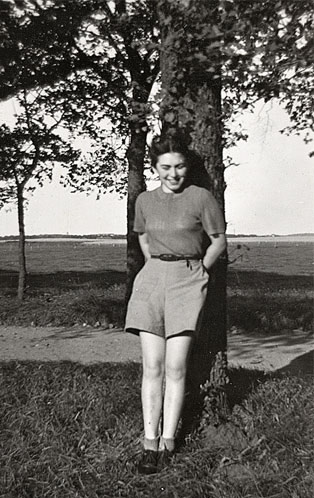
S.S.: This was in the Gera area. The Gera area was very very nice.
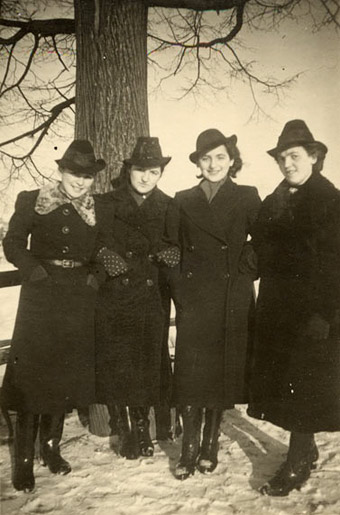
S.S.: From left to right: Toni, and the three Mostovicz sisters: Esther (with the polka dots gloves), her youngest sister Rosa (Rosel), and Edith ("Idel").
Esther and Edith came to America. Rosa (Rosel) was deported with her parents. This was taken in 1939, I think.
These girls were stateless, and as such there were not deported with the Polish Jews. They were from Poland, but they lost their Polish citizenship, so they were not deported at the same time as the Polish Jews who were deported in October of 38. And these two got out, and so did Toni, but this little one, the younger was deported with her parents, and she died.
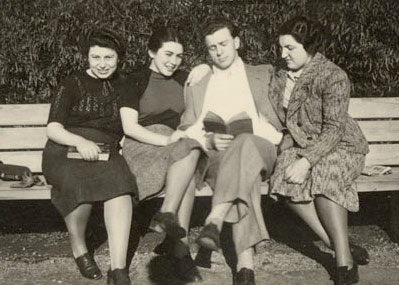
S.S.: From left to right, this is Regina Frost (Adi's sister), Toni Katz, Adi Frost and Esther Mostovicz.
Adi Frost went to England, then Canada: his sister Regina escaped to England.
Esther Mostovicz went to Brooklyn, married and became Esther Flieg.
Idel Mostowitz immigrated to the USA in 1939, married and changed her name to Edythe Bronstein. She lived in San Diego. She was "my friend from San Diego" Toni would mention.
After Leo and Frida were deported in 1938, Toni stayed with Esther Flieg's family who gave her a place to stay. She gave them some money from the sale of the furniture and other things in her parents' house.
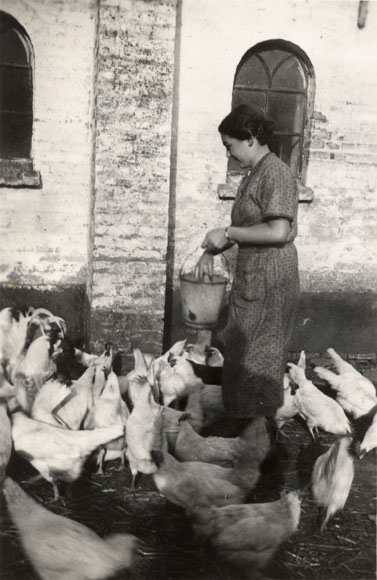
(Photo courtesy of Shulik Mir)
S.S.: This is when she was in Hachshara. There's no question, because in Gera she didn't go around chickens...
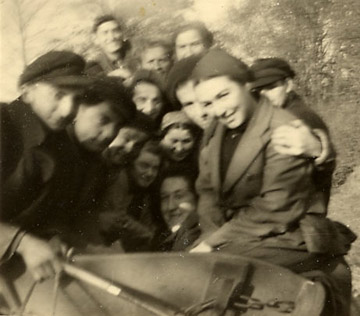
S.S.: Maybe this is when she was in Hachshara, and the people she was with.
Part 4: Xeroxes of photos from Shulik's album

(Photo courtesy of Shulik Mir)
S.S.: this is Michel (Michael) Katz, Willy's Katz' brother.

(Photo courtesy of Shulik Mir)
S.S.: This is Fritz Cohn, he was the assistant Rabbi, a preacher. In our town we didn't have a Rabbi. Toni baby-sat for his daughter, Aviva Cohn.

Aviva Cohn, May 1937.
(Photo courtesy of Shulik Mir)
S.S.: This is Fritz Cohn's daughter Aviva. He and his family immigrated. Last I heard he was in the state of Washington, on the West Coast. I never saw him.
Aviva Cohn contacted me in 2011, almost 75 years after this photo was taken, after recognizing herself on these photos. She provided the following information:
The Cohn family was in Gera for only a year or so, from 1936 to May 1938.
Fritz Cohn was the community Rabbi - the "preacher" - meaning he did the same thing as a Rabbi, but wasn't ordained - he hadn't gone to the seminary. He was involved with the Youth Alyah and went from community to community to get kids to immigrate - he prepared kids for hachshara.
While in Gera, he authored a book on the history of Zionism: "Von Pinsker bis Weizmann Im Kampf fur eine Idee" ("The Fight for an Idea - from Pinsker to Weizmann.")
The family left Germany and Fritz Cohn became a rabbi in Seattle and then Los Angeles. He was West Coast Director of the Histadruth - fund raising until 1948. He died in 71
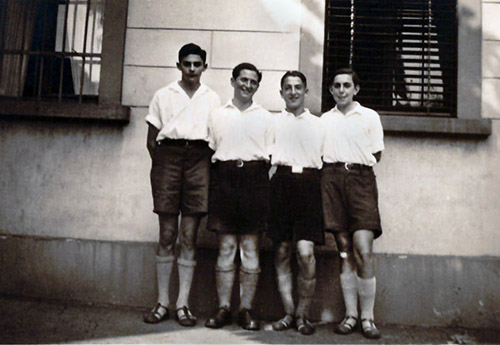
(Photo courtesy of Shulik Mir)
From left to right: Malachowsky, Leo Gutwilen, Zawadski, Yitzhak Katz
S.S.: These are all boys in my group. I was their leader.
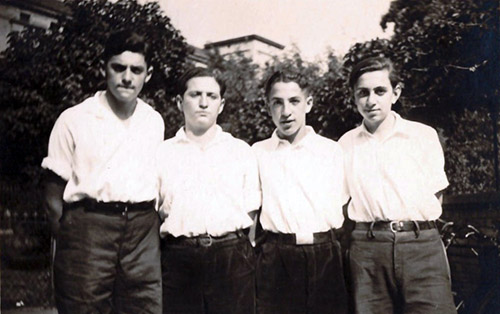
(Photo courtesy of Shulik Mir)
From left to right: Malachowsky, Leo Gutwilen, Zawadsky, Yitzhak Katz
S.S.: There is Yitzhak, Zawadzki, Leo Gutwilen, Malachowsky
I was the youth leader. "Habonim Noar Chaluzi" - it was a Zionist Youth movement.
We used to go on hikes. I became the leader at some point. We held weekly meetings which were witnessed by the Gestapo, they were sitting in - the Gestapo was there, or else we weren't allowed to meet. They said the only reason we allow you to meet is so you prepare yourself to leave. This was until it was all broken down and came to an end in 1938.
Augusta Flieg Levine: Malachowsky came to the US and lived in Seattle.
Yitzhak had left before, this photo was probably taken in 1936. Yitzhak and Gutwilen went with Youth Aliyah, I think Malachowsky also did.
Toni used to be very very friendly with this boy, the boy at the end, Malachowsky. All these boys emigrated.
In the end they wanted me to take over, I think it was Breslau, one of the Eastern German cities, as a Youth leader, and I have papers here which were for a leave of absence from the Youth movement, to come to America to help my parents, because my brother had left, he was in Israel, my sister had left, and my mother was an invalid, so I supported them. They had no income, between the money I made as a bricklayer apprentice... and when I lost that job, in 38, then I came here in the US, and sent home money to support them, they had nothing to live on, and of course, (..?..), they were deported (to Poland).
And then, fortunately, they wound up in the Russian area of Poland - when Hitler invaded Poland in 1939, Russia invaded from the East - and they were in Lemberg, on the Bug, the part of Poland that became Russia.
So we were able to support them, my sister and I, from here, until 1941. As soon as the Germans declared war on Russia, the first thing they did was round up the Jews and kill them, the Einsatztruppen came in and it was...
By that time I was in the army too. I volunteered, here, to be in the American army. My brother was with the First Battalion of the Jewish Brigade, in the British Army. We were both in Africa. I was at the invasion of Africa, and he was in Tunisia... Then I was in Sicily. I was on two invasions on D-Day. One in Africa, then all through Africa then over to Sicily, the invasion of Sicily, went through Sicily, then from Sicily I went to England, and back for the invasion of France. I was wounded in Normandy. I spent three years overseas. I left in April 45, one month before the war was over.

(Photo courtesy of Shulik Mir)
Siegmund Spiegel (1), Adi Frost (2), Saul Katz (3), Yitzhak Katz (4)
S.S.: These were the younger group. This is me up on top, this is Saul Katz, Adi Frost, Zeldman (?) Saul Blachman, Rosa Vanic (?)- she was a single girl, Yitzhak Katz, Isaacman on the right (?); Heinz Heidelman, he got killed, Leo Gutwillen, Bütow...
This little boy here (5), he was mentally retarded. So what the Germans did, they got a prostitute to be with him, and then they arrested him for "defiling the race", they castrated him.
Daphna Weber: "Saul Blachman escaped with his sister last minute out of Hamburg to America; Leo Gutwillen made it to Palestine and lived for many years in Naharia, Israel."

(Photo courtesy of Shulik Mir)
Left to right, front row: Ingo Wilamowsky, Abraham Mostovicz, Ben Stalnikovicz
Back row: Yitzhak Katz, Saul Katz
S.S.: This was the young group: Ingo Wilamowsky, Abraham Mostovicz (elder brother of Esther and Edythe), Ben Stalnikovicz, Saul, and Yitzhak
Augusta Flieg Levine: Ingo Wilamowsky went to the US.
We had an even younger group. I was leader of the young group, and of the younger one. And in the younger one we had Max Frankel. (Note: according to Max Frankel, this is wrong as he lived in Weissenfels and not Gera.)

(Photo courtesy of Shulik Mir)
S.S.: As a matter of fact, I remember when I left by train, the train pulled out of the station, and at the end of the station, all of the sudden there were four or five who were left, who did a dance as I left. By the time I left, there were three or four boys left in the group: Saul Katz, Adi Frost... They stood as the train left the station, they saluted me.
From there I had to go to Leipzig to the hospital to say goodbye to my mother because they threw her out of the hospital in Gera, because she was Jewish, we had to find a Jewish hospital for her.
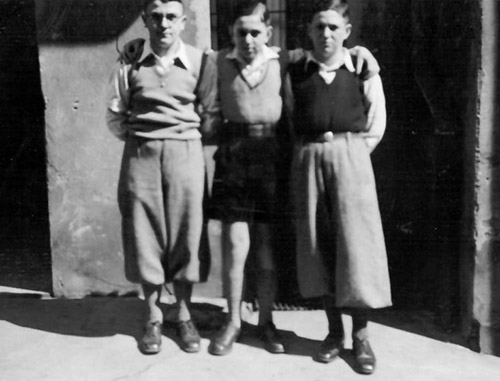
(Photo courtesy of Shulik Mir)
Yitzhak (center), and two friends.
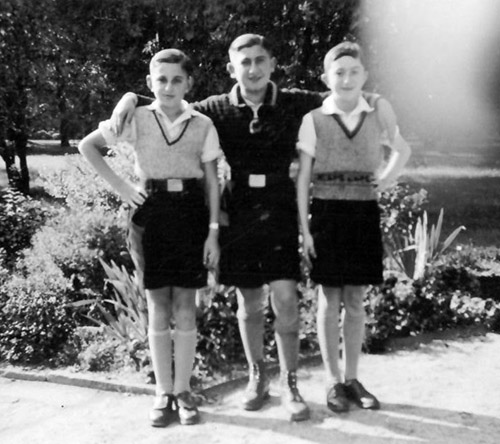
(Photo courtesy of Shulik Mir)
Yitzhak, ?, Saul Katz
I have some questions for you now...
D.A.: How did you know Toni?
S.S.: I met her when I was this big, and she was that big...
D.A.: But how did you meet?
S.S.: Our families knew each other.
D.A.: How? Where did your family come from? Were they German? Or they came from Poland?
S.S.: They were Polish - Polish Jews.
D.A.: Not from the same town?
S.S.: No, but in Gera, there were two different types of Polish Jews. There were the Galizianers, which we and the Katzes were, then there were the Litvaks, which were the Russian Jews. And the two of them were separate - until of course, later on, the second or third generations became friendly, but the other generations, the Galizianers associated with Galizianers.
D.A.: And always separate from the German Jews?
S.S.: That's right, of course. And I remember, at the very early stages, I was a very small child, and this is before Toni and her parents lived in MargaretenGasse, for a very short time, they lived upstairs in a hotel, near the marketplace. I remember...
D.A.: When was that?
S.S.: This was 1921, 1922.
D.A.: So when they arrived...
S.S.: Yes, shortly after they arrived.
D.A.: So you knew them already when they arrived.
S.S.: Yes... As a matter of fact, I remember distinctly, Toni had a small tea set, a children tea set, and I was invited to have tea with her...
D.A.: So your family knew Leo Katz while he was still alone...
S.S.: Sure, sure...
D.A.: ...Before the family came
S.S.: The family came... Toni was born in Poland, Yitzhak was born... I think he was born in Gera? (note - he was born in Sokal) - I'm not sure...
D.A.: So you remember...
S.S.: Toni as a small girl.
D.A.: But you remember before she came... you remember... in the beginning you say they lived in a hotel.
S.S.: Yes, upstairs of a... downstairs of the hotel were apartments, upstairs I forget now exactly what there was... It was on the marketplace.
D.A.: How old were you?
S.S.: Three... four... I was born in 1919. I remember that because one thing that you recollect sometimes as a child, is when certain things (?) just your mind.
D.A.: So your parents were friends with her parents?
S.S.: Yes.
D.A.: And your family also had a store...
S.S.: Yes...The same, the same.
D.A.: And you lived in the same neighborhood?
S.S.: Not necessarily the same neighborhood... Jews in Gera did not live in a ghetto. In other words, we were the only Jews on that street where we were; they were the only Jews on the street where they were. They were on MargaretenGasse.
D.A.: How did you know they were the only Jews? Like was it possible to...
S.S.: I knew the Jews! In my town!...
There was one area which was on the corner above RheinStrasse and StrochenStrasse (?), there were four or five families closer together, but there was one area where Polish Jews were congregating more than in other areas. We were remote from that. Aron and Mathes Katz lived closer to that area where more Jews were. And every Shabbos afternoon, there'd be (?) walking out there (?).
D.A.: So what can you tell me about her parents? What kind of people they were...
S.S.: Very honorable, very very business (or decent?) people, working hard to make a living, they had their own store.
Certainly they worked hard to send Toni to school... Whenever you went to anything but the public schools, you had to pay for them. She went to public schools for the first three years, but then she went to the MittelSchule, which cost money. The first four years were public school, then came the high school.
I went to Gymnasium at the time - I was the only Jew in Gymnasium, and on April 1st, 1933, my father was called to the school, "Herr Spiegel, I want my school to be Judenrein" - free of Jews. So I had to go back, for one year, to public school. Public school, the Germans insisted, you had to go to school, but you were not allowed to go to high school.
D.A.: I know Toni stopped school early too, and I've never known if she was kicked out of school, or if she left because they made her life too difficult.
S.S.: Obviously kicked out. We didn't do anything voluntarily.
D.A.: Her parents: what did they speak at home? German? Yiddish?
S.S.: German and Yiddish. Mostly German.
D.A.: How did they know German?
S.S.: They learned it. You know initially, all Polish Jews, initially, their German was not too good, but... Did Leo serve in the Austrian-Hungarian army? Yes, then he must have learned some German there... My father spoke an excellent German. He spoke Yiddish, and actually spoke Polish also, but he never spoke Polish to us....
D.A.: So, at home, they spoke German?
S.S.: Yes. Some Yiddish expressions.
D.A.: Do you know how religious they were?
S.S.: They were orthodox.
D.A.: Which meant?
S.S.: Which meant... not Hassidic! But they were conservative. Kosher.
D.A.: For example, Frida, did she shave her hair?
S.S.: No. She had all her hair. All the Katz women had their own hair.
D.A.: But they kept kosher?
S.S.: They kept kosher.
D.A.: And Shabbat?
S.S.: Yes. That was assumed.
D.A.: And the men covered their head?
S.S.: At home they didn't cover their heads. They didn't walk around with a kippa. They really were slightly emancipated.
D.A.: So they didn't have a kippa, they didn't cover their heads in the store?
S.S.: No they didn't, and they didn't cover their heads in their houses either.
D.A.: So they just kept kosher and Shabbat?
S.S.: Yes, that's right. You would probably call this here "conservative" or "orthodox". Like they didn't smoke on Shabbat.
D.A.: Do you know if politically, did they have any... did that even matter?
S.S.: They were mostly Social-Democrats, in the sense... whereas the Russian Jews were often Communists. They were some groups that wanted to settle in Birobidjan, which is a colony in Siberia.
D.A.: The Galizianers...
S.S.: They were Zionists, most of them were Zionists
D.A.: Were her parents Zionists?
S.S.: Yes.
D.A.: But did they ever consider going?
S.S.: No, they let their children go, like when Yitzhak went, you get settled, then when the time is right, we'll come. Of course, the time was always too late. Same as my parents. And my brother went to Israel in 35, so they... like real good Jewish parents, it was important for them to see their children taken care of in their children world. And that the children be well and then they'll come... "Call for us, call for us..."
D.A.: Could people tell that your family or Toni's family were Jewish or foreigners?
S.S.: Sure.
D.A.: Based on how they looked? How they dressed?
S.S.: No. They dressed like every decent human being were dressed. But first of all it was immediately known that you were Jewish. In Gera, everybody knew who was Jewish... Then they went by names too... "Katz". Of course Katz very often people said "all right, they're Germans..."
D.A.: Did they have any German friends? Or all their friends were Jewish?
S.S.: No... there were occasions... also you had neighbors that you associated with...
D.A.: But would you say that most of their friends were...
S.S.: Jewish.
D.A.: And they were Galizianers?
S.S.: Yes.
D.A.: Did they have any contacts with German Jews?
S.S.: Very little. It is we, as their children, who had contact with German Jews, because we went to religious school, and there we went to a school where the teacher was the same man who was... not a rabbi but... I suppose half a rabbi at the German synagogue. The Germans had their own synagogue. But because of the religious school, all the kids then belonged to the same choir, which was made up of the kids who went to this religious school.
D.A.: So Toni went to religious school?
S.S.: Yes.
D.A.: So it wasn't just the boys?
S.S.: No, boys and girls.
D.A.: It was mixed?
S.S.: Yes, it was never orthodox.
D.A.: Did you go to school with her?
S.S.: Yes, it was once a week, in the afternoon. But then we also met in youth groups naturally.
D.A.: What age was this? Around bar-mitzvah age?
S.S.: Sooner than bar-mitzvah age. Age ten. And it would be over by bar-mitzvah time. Actually, bar-mitzvah you didn't get taught in that school. Bar-mitzvah you went to a private teacher, an orthodox teacher.
D.A.: But that was for boys only?
S.S.: Boys only. We didn't have any Bat-mitzvah in Germany.
D.A.: Can you describe their house?
S.S.: Comfortable... living room obviously, not ostentatious. Middle class.
D.A.: Both apartments?
S.S.: Yes.
D.A.: Why did they move?
S.S.: I think when they lost their business on MargaretenGasse, then they moved to LeontinenStrasse, that was already a smaller apartment, I think at that point, already, economically, things were not going too good for any of us, or any of those jobs.
D.A.: And then they ran the store from the apartment?
S.S.: I believe so. Yes, you had a closet full of merchandise, and that's it! Because then most of the business was conducted, literally, going to your customers - usually to a house - and bringing stuff, peddling, in a sense.
D.A.: So it went back to peddling?
S.S.: Yes.
D.A.: Your father did that too?
S.S.: Yes.
D.A.: Your parents did the same thing?
S.S.: Exactly.
D.A.: But the kids didn't work in the store?
S.S.: No.
D.A.: Can you remember the store before that?
S.S.: I knew the store down in MargaretenGasse, it was small, linens and things...
D.A.: So all fabrics?
S.S.: Not fabrics, ready-made goods. Linens and underwear, these types of things.
D.A.: But always made out of cloth?
S.S.: Oh yes.
D.A.: I thought it was things for the house, pots and pans...
S.S.: No, not to my recollection.
D.A.: This store was Leo's store.
S.S.: Leo and Frida's.
D.A.: It wasn't the brothers' store?
S.S.: I don't recall the three brothers being in one store.
D.A.: In the beginning, Leo came to Gera because his two brothers had a store together, so they all worked together, and then I think they all had their own store.
S.S.: I see...
D.A.: What else do you remember?
S.S.: There's nothing special that I remember about the family Katz. All our families were in a very similar situation. And then of course, when the time came, in the early 30s, you know when things became a little more difficult, then the Jewish youth was closer than ever before, and at one point, you couldn't associate without the Nazi attendance anyway (?), and everybody had to be concerned about where are we going to go, how are we going to get there, what do we need to get out, will somebody let us in? You know, there were big problems. And what do you do for money? Which was another problem. And to try to get out...
At some point, I was attempting to go into Youth Aliyah, and I was told, "no, we need you here, so don't go". So I just stayed. My mother suffered a stroke the day my brother left for Palestine, this was in 1935. And she couldn't walk anymore. As a matter of fact, when I went to America, I had to go to Leipzig, to the Jewish Hospital to say goodbye to her, and she just said "Are you coming back to get us" (??)...
My brother was unable to help from Palestine, he lived in a kibbutz. There's a picture of my mother in that hospital when I went to see her... as I said goodbye to her, I took the picture....
They did something else to her. They dragged her. She couldn't walk. (going through Werner Simsohn' book on Gera Jews). Here: the way they collected the Jews and sent them over to Poland. And how for a month almost the Germans chased them across, and the Poles wouldn't let them in... and so on. And my mother couldn't walk, and then they got to the station and, they dragged her to the station, she couldn't get up to the train, so my father, hollered at the policemen in charge of her: "My wife is seriously ill and it's a shame... Where is your humanity..." And ultimately two policemen brought a gurney and carried her up. So this is part of the "nice" things they did...
D.A.: Did you know anything about any other family or relatives they had? Did you know anything about family they still had back in Poland?
S.S.: No.
D.A.: You don't know anything about grandparents, or...
S.S.: No, I never met grandparents so... I'm sure they didn't... no I never...
D.A.: So you don't know if they still had family...
S.S.: No.
D.A.: When Leo and Frida were deported, they went to Krakow, so I wondered if they had relatives there.
S.S.: They may have had. Krakow was the main Galician city with Lemberg - or Lwow... I don't know what the Katz family had.
The reason they had left Galicia as young people was because it was difficult to make a living there, and Germany was the place which had the golden opportunities - same as, for us, America is, a place of golden opportunities... It's the story of the wandering Jew, in a sense... Jews didn't have a homeland so to speak. At least now there's something that gives us a little backbone... which none of us had.
You know the Katz, they were all very honorable people. Very family-oriented, of course, between the various Katzes, maybe - not that I know - but there were some minor things between the women...
D.A.: What do you mean?
S.S.: I don't know that there was much love lost between Frida and Gustel - Gustel was the wife of Aaron Katz.
D.A.: Bill's father... his second wife...
S.S.: The second wife.
D.A.: I think nobody liked her... Bill didn't like her...
S.S.: That's right. As a matter of fact, Bill and Michel - the brothers - for a while - when their real mother died, both of them, for a short while, lived with my parents. They were older than I am, but they were my sister's age. So they lived in our house for a short time.
D.A.: I was told that they lived with Leo and Frida also...
S.S.: Maybe too... but they also lived there for a while in the Spiegel house. Because there was some hard times.
D.A.: But with the others, there were...
S.S.: ...no fights.
Gustel was a hard woman. Again, a very ambitious woman. Constantly running. Her husband walked around with a cane, very slowly, not that he was ill, but he was...
As a matter of fact, Aron Katz was in America, in the early twenties for a short time, and went back to Gera. He liked it better in Gera. He had another brother here, the one I mentioned earlier, the one I'd gone to see, I forget his name, who had problems, the financial problems, and medical problems his wife had... but ... he went back!.... He said, "in America, if you don't know where somebody lives, people..." he used the term "they move!" I remember him using the word "moving" quite frequently. So what people used to do here, if the landlord didn't paint the apartment, you moved...
D.A.: So the brother who came to America, you have no idea when he came...
S.S.: He must have come in the late teens or twenties.
D.A.: And so he lived in Brooklyn...
S.S.: He lived in Brooklyn, and he worked in a deli as a waiter, downtown New York. I remember I found him and I went there. At that time I worked as a dishwasher in an orphanage, before I went in the army. I worked seven days a week, but Tuesday afternoon was my time off - the only time I had every week. I spent Tuesday afternoons looking for papers, to help, trying to get people out... especially at that time I was working for papers for Toni... to leave Germany.
D.A.: For Toni and her parents? Or just for her?
S.S.: For her.
D.A.: Because the parents were already deported?
S.S.: No... no no.
D.A.: They didn't want to leave?
S.S.: Most important thing was, to get the children out. I worked to get her out and Saul... to get them out. Because once the children were here, then you could get the parents. But of course who knew that a month later, or two months later things would be different.
D.A.: And her parents didn't want to leave?
S.S.: Maybe they wanted to leave... But who allowed them to? You could never find the papers...
D.A.: But did they try???
S.S.: I'm sure everybody tried...
D.A.: Yizhack, he joined the group and he left; Toni, she joined the group and she left.
S.S.: They all tried to, they all tried to, but... what future is there? You know, what could they do?
Either you had to be a big capitalist, then you could buy your way out, and none of our parents had that much money. Towards the end, this was hand-to-mouth business. If you didn't take in something one day, god knows what you got to eat the following day... You know it was that sort of thing. It was no longer an easy existence.
Look, their life was to make sure their children are ok... And they all lived for their children. They didn't have an easy life...
The Polish Jews had a hard time making it. Some families were a little more successful. And their businesses were somewhat better. For instance, Jacob Frankel's father, Isaak Frankel, they had a better business, and Jacob Frankel, in Weissenfels, had a very good business. They were held to be much better off than the families in Gera.
D.A.: Do you remember when Yitzhak left?
S.S.: Yes. There was a group, they were four or five boys, I think at the same time, they (?).
D.A.: Do you remember how Toni felt about it? She said her parents didn't want him to leave.
S.S.: Which parent would like to see a child leave? First of all, no matter how difficult it was, no matter how life under the Nazis was...
Look, why would my mother have, when her first child left, my brother, in 1935, she had a stroke, from "excitement". Maybe you see a child leave, and you wish he wouldn't. But when this happened, immediately, with the whole family, over dinner, that evening, no choice, she (?) and got to the hospital, but he's got to leave. If not... Better to save one... So Toni's parents were not in favor of their children leaving...
D.A.: Do you know anything about the jobs Toni had after she left school? I know she had to start working, she had to take an apprenticeship, she worked in Max Bierman's store.
S.S.: Max Bierman was a department store, and he was the Jewish department store, and Max Bierman had also one son, Herbert Bierman, and his second wife, or sister-in-law (?) Sternefeld, they taught her some English. Toni and I, had some English lessons there.
D.A.: I was wondering how she knew English, because she left school very young, she was 13, 14...
S.S.: 13.
D.A.: ...and she spoke excellent English, so I always wondered how she learned.
S.S.: We learned some English from Mrs. Sternefeld, she was one of the Bierman in-laws who on Sunday morning would give us some private instruction. There were 3 or 4 of us.
D.A.: At what age? 15, 16?
S.S.: Yes, 16, 17.... To a small group, and free, no charge.
D.A.: And that's how she learned English?
S.S.: Yes.
D.A.: This was in 1936?
S.S.: 1937 and 1938.
D.A.: So for over a year.
S.S.: Right.
D.A.: And what happened to these people?
S.S.: She was half-Jewish, she ultimately was deported. Herbert Bierman went to Israel, because two of his children went on Youth Aliyah, same as Yitzhak. And Erich (?) Bierman, the other brother, came to New York, and he became a drunkard. I mean these are people who really had big big businesses.
D.A.: So this is a son of Max Bierman?
S.S.: That's right. Max Bierman was dead. Herbert and Erich were his sons, and they owned the business. Herbert Bierman became quite an ardent Zionist, and as I said, his children both went on Youth Aliyah to Israel.
D.A.: So she worked at Mark Bierman
S.S.: Yes... until it was "Aryanisiert". Until it became "Aryan" and the business was taken over.
D.A.: She worked with Ruth Birnbaum...
S.S.: Yes, who lives in Pittsburgh. I keep in contact with her.
D.A.: That was the first thing after school?
S.S.: I think so, then for a while, I think she was a KinderMadchen. Why else would she have (?) of Cohn and of Aviva Cohn...? "governess for a small child", or sitter - babysitter.
D.A.: This is something she did on the side?
S.S.: Yes maybe... she (did this) almost for a while.
D.A.: And after that she went to Flensburg, but you had left.
S.S.: Yes.
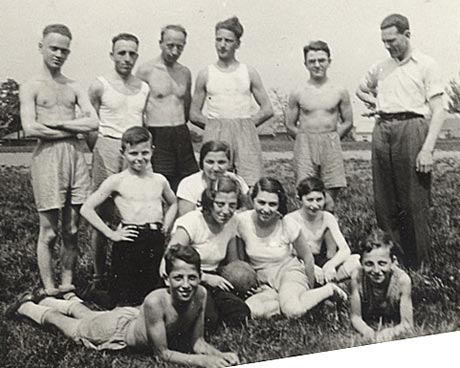
(Photo courtesy of Siegmund Spiegel)
"Bar Kochba", Gera, ca 1935.
Front row, 3rd from right: Toni Katz, next to Saul Katz. Bubi (Dov) Wilamowski on the ground on the right.
Middle row: Esther Mostovicz (Flieg).
Back row: third man standing from the left, shirtless: Ingo Wilamowski
Biographical Details about people mentioned on this page.
Below are some additional details about friends of Yitzhak and Toni Katz who appear on this page.
Siegmund Spiegel
Siegmund Spiegel was born in Gera in 1919, the son of Jakob Spiegel and Sara Precker. His parents came from Galicia (Austria-Hungary). Jakob Spiegel was a tradesman and a soldier in World War I.
Siegmund went to the Jewish school in Gera in Meistergäßchen. He then attended grammar school and had to leave high school before he could graduate. He became active in Youth Aliyah and managed to flee to the USA. He volunteered in the US Army during and fought in North Africa and participated in the landings in Sicily and Normandy. He was an architect and honorary doctor (1993). He died in 2016.
His brother Nortbert (later Nahum Golan) emigrated to Palestine in 1935. During World War II he fought in the British Army's Jewish Brigade and after the establishment of the State of Israel became a colonel in the Israel Defense Forces. From 1948 to 1950 he was commander of the Golani Brigade with the rank of Brigadier General. He later was a diplomat and political scientist in Israel. His sister Bertha also managed to emigrate to New York where she was a doctor.
Siegmund's parents were deported to Poland on October 28, 1938. They were later murdered after the occupation by the Germans of Lemberg (Lvov) on June 29, 1941.
Sources:
https://stolpersteine-gera.de
www.geni.com
de-m-wikipedia-org
Leo Gutwilen
Leo Gutwilen was born in 1921, the son of Abraham Gutwilen and Renata Pick. The Gutwilen couple were originally from Poland. They came to Gera around 1920 fleeing the pogroms of the Polish-Bolshevik War. Abraham Gutwilen was a self-employed textile merchant and Rena was a darner. They owned a shop on Zschochernstrasse in Gera. Leo had a younger sister, Henriette (born 1922), and twins Hermann and Helene (born 1931).
Leo and his sister Henriette joined the Gut Groß-Breesen Hachsharah (training farm for emigration) near Trebnitz, Silesia. They were able to flee to Palestine in 1937 with the Youth Aliyah.
Leo Gutwilen's daughter is called Hagar Rubin.
Leo's parents and twin siblings were deported to Poland on October 28, 1938. After being forced to stay in the Litzmannstadt ghetto, the family was deported to Kulmhof on March 25, 1942 where they were murdered. Abraham Gutwilen died at the age of 47, Renata was 53 and the twins Hermann and Helene Gutwilen only 11 years old.
Source:
https://stolpersteine-gera.de
Postscript
Since posting this interview, several descendants of people mentioned on this page have contacted me. Here is what they wrote:
Jay Wilamowski wrote:
My father, Joe (Ingo) Wilamowski, came to New York in 1938. [We lived in] Washington Heights, home to the German/Jewish refugees.
My uncle, Dov (Bernhardt) Wilamowksi, went to Palestine when he was around 14 years old. My other uncle, Samuel (aka Sali), who was born in Gera in 1919, went to Denmark and eventually evacuated to Sweden.
My father was a good friend to Siegmund Spiegel since Gera days. I suspect your mother must have know my father since they are in the same photo together. She may have known my uncle Sali too since they were exactly the same age.
Aviva Cohn, who appears on a couple of photos as a baby, wrote:
I am the child that Yitzhak is holding also the one with the wooden dog. My father was Fritz Cohn, he was the community Rabbi ("preacher"), meaning he did the same thing as a Rabbi, but wasn't ordained - he hadn't gone to the seminary. He went from community to community, and his main job was to get kids to do Aliyah - he was involved with the Youth Aliyah. He prepared kids for Hachshara in Gera. [We] were in Gera for only a year or so from 36 to may 38.
I grew up on the West Coast where my father was a rabbi in Seattle and then Los Angeles. He was West Coast director of the Histadruth fund-raising until 1948.
Daphna Weber, Salmon (Shlomo) Herschberg's daughter, wrote:
Salmon (Shlomo) Herschberg was a well known swimmer in Gera and left Gera in 1935 to take part in the Maccabia in Tel Aviv. His parents David and Rosa (Rachel) Herschberg were send to Poland in 1938 after Kristallnacht.
Siegmund Spiegel remembered my father and my grandfather, he even joined my father to Leipzig for his swim competition.
I have visited Gera in 1989 and found my father's house intact which was on ReichStrasse 8.
Daphna also gave updates on two other people from Gera:
Leo Gutwillen made it to Palestine and lived for many years in Naharia, Israel.
Saul Blachman was Salmon (Shlomo) Herschberg's cousin. He escaped with his sister at the last minute out of Hamburg to America.
Augusta Flieg Levine, daughter of Ester Flieg, wrote:
All the young Jewish people in Gera were so very close to each other. I recognized so many names and faces, Adi Frost, Moshe Malachowsky, Ruth Birnbaum. I have the picture of your mother with my mother and her two sisters in my bedroom! The youngest sister was indeed Rosel, or Rosa. The other sister was Idel, known here as Edythe. She married Harry Bronstein and they lived in California. She died in 1978.
I have letters from Rosa and Abram after they were forced to leave Gera. They ended up in Bialystock. After a while, the letters stopped coming and I don't know what happened to them. I tried looking for them through the Red Cross but could not find anything.
Esther Wartell wrote:
The name above a photo, in your interview with Siegmund Spiegel, is my uncle, Saul Blachmann. He was from Gera, as was my mother. They escaped, and fled to America. Both are now deceased.
Mr. Spiegel did know my mother, her brother, and their younger sister.
David Borenstein wrote:
My father, Herman Borenstein, was born in Gera. He lost his parents, Leo and Pepi and Sister Freida during the war. He came to the US and served in the Army in Europe.
Siegmund Spiegel replied:
Of course I knew Family Borenstein. All of them, and Hermann very well!
Helene Frisch wrote:
Mon mari M. Uriel Frisch vient de trouver qu'il etait un parent par alliance de Siegmund Spiegel. Sa grand-mère paternelle, Sima Frisch, née Halpern, était la soeur de Dvora Spiegel, née Halpern, habitant à Gera, tante de Siegmund Spiegel.